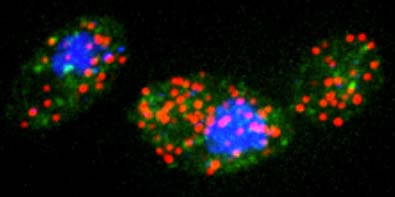The coronavirus pandemic and the development of the novel vaccines has brought mRNA into the public eye. mRNAs are transcripts of DNA. They serve as a template for protein production and are degraded after a certain time. Already, for more than twenty years, researchers have been working with mRNA for use in the treatment of cancer. A great hurdle in the development of mRNA-based therapies, however, is the generally very low stability of the molecules. To be effective, they should not be degraded too quickly nor too slowly within the cell.
mRNA degradation faster at high temperatures
Prof. Attila Becskei from the Biozentrum of the University of Basel has been intensively studying the degradation of mRNA molecules in the cell and their stability for years. In a previous study, Becskei was able to demonstrate that mRNAs in yeast cells have only a very short lifespan of just a few minutes. The team has continued this work. “The lifespan of mRNA, also known as the half-life, continually decreases with increasing temperature,” explains Becskei. “An increase in temperature leads to faster biochemical reactions and thus even faster degradation of mRNAs in the cell.” However, there are exceptions. Non-coding RNAs, which are the incapable of protein production, can have a prolonged half-life at high temperatures.
Researchers clear controversy about mRNA half-life
Until now the findings regarding the half-life of mRNAs under stress conditions, such as heat, have been contradictory. Most researchers have postulated that mRNAs live longer with increasing temperature, as the degrading enzymes become denatured and can no longer work properly. Using a new, minimally invasive method, Becskei has now been able to prove that this is not the case. “The measuring procedures themselves cause stress within the cells, and consequently, the enfeebled cells degrade their mRNAs more slowly,” says Becskei. “This obscures the temperature effect and distorts the results.” Certain assumptions will need to be revised, because with the many conventional methods it is not possible to make an accurate measurement of the mRNA stability.”
Cell can counteract accelerated degradation
However, there are also some mRNAs that still remain stable even at higher temperatures, which means that they are less rapidly degraded in the cell than the average mRNAs. Here, a protein plays a central role, which sorts out defective mRNA at normal temperatures. “At higher temperatures, this specific protein protects in particular those mRNAs, which are important for the production of key cell wall and membrane components and the ribosomes, from accelerated degradation,” explains Becskei. This mechanism can maintain a constant mRNA turnover at changing temperatures to a certain extent and protects the cell from the negative consequences of heat stress. But also the mRNA composition has an influence on the rate of degradation and thus its half-life.
Optimizing mRNA-based vaccines
The design of a mRNA vaccine plays an important role for optimal efficacy. This requires appropriate and above all precise methods to measure the mRNA properties. “For their use as a vaccine, the mRNAs must be modified, so that the cells produce enough proteins,” says Becskei. “On the other hand, the mRNAs must also be then completely degraded so that not too much protein is produced.” With their current study, Becskei’s team provides a reliable measurement method that can contribute to optimally design mRNAs and ultimately to produce effective vaccines, whether against infectious diseases, cancer or dementia.
Original publication:
Vincent Jaquet, Sandrine Wallerich, Sylvia Voegeli, Demeter Túrós, Eduardo C Viloria, Attila Becskei. Determinants of the temperature adaptation of mRNA degradation. Nucleic Acids Research; published online 25 January 2022
Contact: Communications, Katrin Bühler



